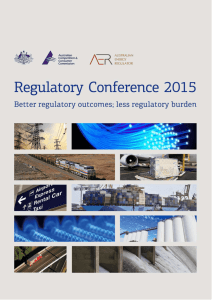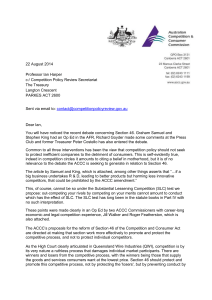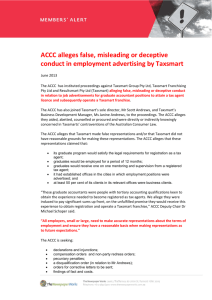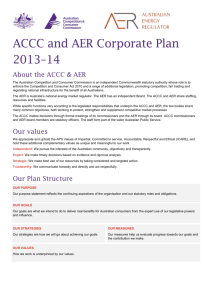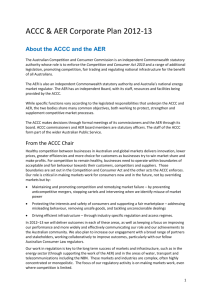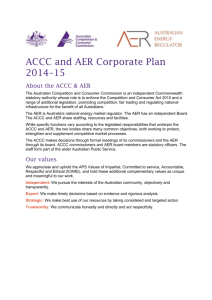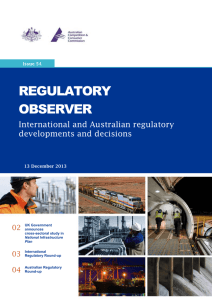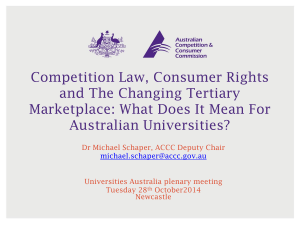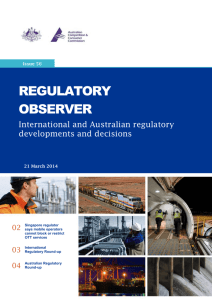ACCC/AER Regulatory Conference 2014
advertisement
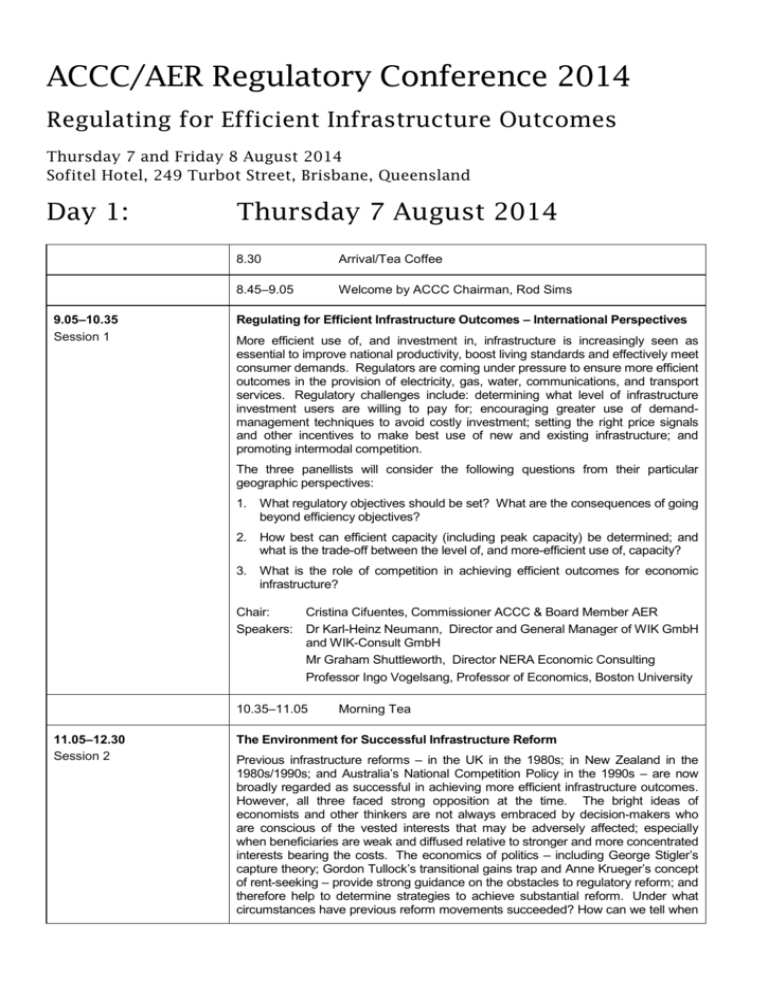
ACCC/AER Regulatory Conference 2014 Regulating for Efficient Infrastructure Outcomes Thursday 7 and Friday 8 August 2014 Sofitel Hotel, 249 Turbot Street, Brisbane, Queensland Day 1: 9.05–10.35 Session 1 Thursday 7 August 2014 8.30 Arrival/Tea Coffee 8.45–9.05 Welcome by ACCC Chairman, Rod Sims Regulating for Efficient Infrastructure Outcomes – International Perspectives More efficient use of, and investment in, infrastructure is increasingly seen as essential to improve national productivity, boost living standards and effectively meet consumer demands. Regulators are coming under pressure to ensure more efficient outcomes in the provision of electricity, gas, water, communications, and transport services. Regulatory challenges include: determining what level of infrastructure investment users are willing to pay for; encouraging greater use of demandmanagement techniques to avoid costly investment; setting the right price signals and other incentives to make best use of new and existing infrastructure; and promoting intermodal competition. The three panellists will consider the following questions from their particular geographic perspectives: 1. What regulatory objectives should be set? What are the consequences of going beyond efficiency objectives? 2. How best can efficient capacity (including peak capacity) be determined; and what is the trade-off between the level of, and more-efficient use of, capacity? 3. What is the role of competition in achieving efficient outcomes for economic infrastructure? Chair: Speakers: Cristina Cifuentes, Commissioner ACCC & Board Member AER Dr Karl-Heinz Neumann, Director and General Manager of WIK GmbH and WIK-Consult GmbH Mr Graham Shuttleworth, Director NERA Economic Consulting Professor Ingo Vogelsang, Professor of Economics, Boston University 10.35–11.05 11.05–12.30 Session 2 Morning Tea The Environment for Successful Infrastructure Reform Previous infrastructure reforms – in the UK in the 1980s; in New Zealand in the 1980s/1990s; and Australia’s National Competition Policy in the 1990s – are now broadly regarded as successful in achieving more efficient infrastructure outcomes. However, all three faced strong opposition at the time. The bright ideas of economists and other thinkers are not always embraced by decision-makers who are conscious of the vested interests that may be adversely affected; especially when beneficiaries are weak and diffused relative to stronger and more concentrated interests bearing the costs. The economics of politics – including George Stigler’s capture theory; Gordon Tullock’s transitional gains trap and Anne Krueger’s concept of rent-seeking – provide strong guidance on the obstacles to regulatory reform; and therefore help to determine strategies to achieve substantial reform. Under what circumstances have previous reform movements succeeded? How can we tell when and when not to push the public debate? Chair: Speakers: 12.30–1.30 1.30–2.55 Session 3 Lunch Regulating in the Face of Declining Demand Several regulated services in Australia are facing the prospect of declining demand, including demand for Australia Post’s letter service due to competition from email; decline in demand for electricity network services due to competition from local generation; and decline in demand for fixed-line telecommunications services due to competition from mobile services. The prospect of a decline in demand gives rise to key issues for regulators. For example, declining demand often reduces the revenue received by the service provider, but allowing an increase in prices raises the risk that it will induce more customers to switch to the substitute, further reducing demand. What are the financial implications of a decline in demand and who should bear the risks? Chair: Speakers: 2.55–3.25 3.25–4.45 Session 4 Andrew Reeves, Chairman AER Dr Wendy Craik, Commissioner, Productivity Commission Mr John Pierce, Chairman, Australian Energy Market Commission James Cox, Board Member AER Professor Ingo Vogelsang, Professor of Economics, Boston University Dr Ahmed Faruqui, Principal, The Brattle Group Afternoon Tea Economic Regulators: Achieving Compliance to Promote Efficient Regulatory Outcomes As regulators, the ACCC and AER are required to make a range of statutory decisions. In ensuring compliance with those decisions and with the law, the ACCC and the AER have the discretion to take compliance action. The AER has taken some compliance action and its enforcement powers are the subject of a SCER review. For the ACCC a range of compliance and enforcement issues arise in regulated industries. The session will explore the question of how economic regulators can achieve efficient regulatory outcomes by promoting compliance. It will consider how a regulator might formulate a holistic compliance strategy in a resource constrained environment, including how priorities can be set and results monitored. Chair: Sarah Court, Commissioner ACCC Speaker: Professor William Kovacic, Director of the Competition Law Centre, George Washington University (former Chairman of the FTC) Discussant: Dr Rhonda Smith, University of Melbourne 6.30–10.30 Conference Dinner Dinner speaker: Dr Kerry Schott Day 2: 8.30–10.00 Breakout Session 1 Friday 8 August 2014 Communications: Regulating in a Dynamic Industry Environment Telecommunications markets are highly dynamic, reflecting the rapid emergence of new technologies, development of innovative products and delivery methods, and growing consumer demands for more data, mobility and being ‘always connected’. Government policies on Next Generation Networks, spectrum allocation and universal service further shape the industry environment. The dynamism of the telecommunications industry creates challenges for regulators. Regulations need to promote efficient access to ‘bottleneck’ infrastructure and competition in related markets while, at the same time, maintain incentives for efficient investment and innovation. Regulators need to understand how new technologies, new products and increasing convergence can potentially break down or reinforce traditional bottlenecks, create new sources of market power, and/or alter the effectiveness of established regulatory approaches. Chair: Michael Cosgrave, Communications Group General Manager, ACCC Speaker: Professor Johannes M Bauer, Chair of the Department of Telecommunication, Information Studies, & Media, Michigan State University Discussant : Dr Karl-Heinz Neumann Director and General Manager of WIK GmbH and WIK-Consult GmbH Electricity: Is more dynamic retail pricing a solution to achieving more efficient outcomes? How should retail tariffs be structured? There has been considerable discussion around the potential benefits of implementing dynamic pricing structures in retail electricity markets. Proponents argue that flexible retail tariffs could deliver more efficient infrastructure utilisation and improve consumer choice. This session will explore North American experiences in implementing dynamic pricing and how to structure prices in a way which promotes efficient outcomes. Chair: new AER Chairperson Speaker: Dr Ahmed Faruqui, Principal The Brattle Group Discussant : Mr Matthew Warren, CEO Energy Supply Association of Australia 10.00–10.05 Session Change 10.05–11.30 Breakout Session 2 Water: Designing Water Tariffs: Balancing the Interests and Preferences of Regulated Businesses and their Customers. There has been significant investment in both urban and rural water infrastructure in the last decade, much of it funded directly by governments. While these investments have been important in increasing water security and delivery efficiency, they have also increased the amount that needs to be recovered through customer charges. Both urban and rural water businesses must consider how best to structure their tariffs to meet future revenue requirements while also meeting the needs of their customers. What weighting should water businesses give to customer preferences when setting tariff structures? How can they reconcile tariff preferences which may be inconsistent between customer groups? And what role should regulators play in these matters? Chair: Sebastian Roberts, General Manager Water Branch, ACCC Speaker: Mr John Calleja, CFO Goulburn-Murray Water Mr Brett Mathieson, Manager Regulation and Planning, Yarra Valley Water Transport: Australia's Transport Reforms – Moving with the times? Australia needs an efficient freight transport system to create sustainable growth and drive future prosperity. With freight volumes projected to double over the next 20 years, Australia faces an imminent challenge in promoting efficient investment in, and operation of, the freight supply chains to ensure these increased volumes are supported. The Heavy Vehicle Charging and Investment (HVCI) reform project is considering options for the economic regulation of heavy vehicle road provision whereby charges reflect the costs of road use and promote the sustainable and efficient use of infrastructure. Can any lessons be drawn for the economic regulation of heavy vehicles from the experience in other utility areas; particularly rail? Can any insights be drawn from the European and the UK’s experience with transport pricing policy? Is congestion pricing the answer? Chair: Matthew Schroder, General Manager Fuel Transport and Prices Oversight Branch, ACCC Speakers: Professor Chris Nash, University of Leeds Mr Geoff Swier, Director, Farrier Swier Consulting 11.30–12.00 12.00–1.00 Closing Plenary Session Morning Tea Regulating in the Face of Declining Demand – a Hypothetical Chair: 1.00–2.00 Delia Rickard, Deputy Chair ACCC Lunch Registration Transport Transfers to and from the Brisbane Airport are available as part of the conference registration fee. To book your transfers, contact Mr Chris Lumsden at Your Next Event; Email chris.lumsden@nextevent.com.au; or Mobile: 0409 813 613.
